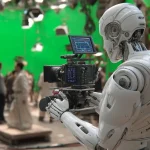Introduction
The 21st century has witnessed a remarkable fusion of celebrity culture, technology, and politics. Famous figures are no longer confined to entertainment—they are leading tech startups, influencing policy, and reshaping global discourse through digital platforms.
As social media, artificial intelligence, and digital branding evolve, celebrities have emerged as powerful players in shaping innovation and ideology. The new frontier of influence lies where fame meets technology and political activism.
Celebrities as Tech Entrepreneurs
Many high-profile celebrities have turned to technology as the next stage of their careers. Figures like Ashton Kutcher, Rihanna, and Will.i.am have invested in startups focused on sustainability, digital security, and artificial intelligence.
These ventures demonstrate how celebrity capital extends beyond entertainment into the realm of business innovation. The credibility and visibility of these personalities often accelerate tech adoption among millions of followers.
Social Media and Political Engagement
The global influence of social media has made celebrities key voices in politics. Through platforms such as X, Instagram, and YouTube, they amplify awareness about climate change, gender equality, and data privacy.
However, the blending of personal branding with political activism has blurred lines between information and opinion. The challenge now is ensuring that advocacy rooted in fame remains factually grounded and socially responsible.
Artificial Intelligence in Celebrity Branding
AI has become an essential tool in celebrity marketing, allowing public figures to analyze fan behavior, automate engagement, and even create digital replicas of themselves.
Virtual influencers modeled after real personalities are already interacting with millions online, revolutionizing the concept of fame. This new digital identity economy raises ethical questions about authenticity and ownership in celebrity culture.
The Political Power of Digital Influence
Governments and politicians are increasingly aware of the power celebrities hold in mobilizing audiences. From voter registration campaigns to global climate initiatives, fame-driven influence is shaping policy debates worldwide.
Celebrities with massive online reach can command political conversations that once belonged solely to journalists or activists, shifting how society engages with governance and reform.
Tech Giants and the Economics of Fame
Technology companies are capitalizing on celebrity partnerships to expand global reach. Platforms like Meta, TikTok, and YouTube rely on influencer content to drive engagement and advertising revenue.
This dependency highlights how fame has become a currency of the digital economy. In this ecosystem, algorithms favor popular personalities, deepening the connection between visibility, power, and profit.
Global Impact of Celebrity-Led Innovation
When global icons back sustainability projects, digital literacy programs, or AI research, the ripple effect extends far beyond entertainment. Their involvement attracts funding, policy support, and international attention.
From renewable energy advocacy to digital equality campaigns, celebrity-led innovation plays an instrumental role in aligning technology with humanitarian goals.
FAQs
How are celebrities influencing the tech industry?
They invest in startups, promote innovation, and use their visibility to encourage tech adoption among large audiences.
What role does AI play in celebrity branding?
AI helps celebrities personalize content, analyze audience data, and create virtual identities to expand engagement.
Why are celebrities involved in politics?
Their platforms allow them to raise awareness about global issues and encourage civic participation among younger demographics.
How do tech companies benefit from celebrity influence?
Partnerships with famous personalities drive user engagement, brand loyalty, and advertising revenue across platforms.
Is the merging of fame and technology ethical?
While it enhances communication and awareness, it also raises concerns about authenticity, privacy, and manipulation.
Conclusion
The convergence of celebrity, technology, and politics is redefining global influence. Fame is no longer limited to entertainment—it has become a strategic tool shaping industries and ideologies alike.
As the digital age evolves, the true test for this new era of influence will be balancing innovation with integrity. If guided responsibly, celebrity-led technology could help build a more informed, connected, and socially conscious world.







